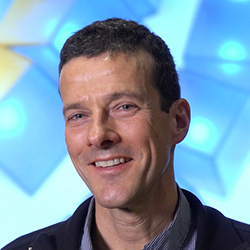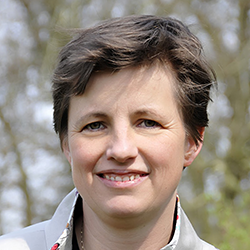Highlights
- Distinctive selection procedure
- Innovative review disclosure
- ICE welcomes full papers to be included in the proceedings
- ICE also welcomes oral communications of already published or preliminary work
- Submission deadlines: April 18 (abstract - extended) and April 21 (full - extended)
- Invited talks: Christian Cachin, Marieke Huisman, and Pawel Sobocinski
- Publication in EPTCS
- Special issue in the Journal of Logical and Algebraic Methods in Programming (Elsevier) (to be confirmed)
Important dates
| April 18, 2017 | Abstract submission (extended) |
| April 21, 2017 | Full paper submission (extended) |
| April 10-May 19, 2017 | Reviews and PC discussion |
| May 19, 2017 | Notification to authors |
| June 21 (afternoon) - 22 (full day), 2017 | ICE in Neuchâtel |
| July 15, 2017 | Camera-ready for post-proceedings |
Scope
Interaction and Concurrency Experiences (ICEs) is a series of international scientific meetings oriented to theoretical computer science researchers with special interest in models, verification, tools, and programming primitives for complex interactions.
The general scope of the venue includes theoretical and applied aspects of interactions and the synchronization mechanisms used among components of concurrent/distributed systems, related to several areas of computer science in the broad spectrum ranging from formal specification and analysis to studies inspired by emerging computational models.
We solicit contributions relevant to Interaction and Concurrency, including but not limited to:
- Formal semantics
- Process algebras and calculi
- Models and languages
- Protocols
- Logics and types
- Expressiveness
- Model transformations
- Tools, implementations, and experiments
- Specification and verification
- Coinductive techniques
- Tools and techniques for automation
- Synthesis techniques
Selection Procedure
Since its first edition in 2008, the distinguishing feature of ICE has been an innovative paper selection mechanism based on an interactive, friendly, and constructive discussion amongst authors and PC members in an online forum.
During the review phase, each submission is published in a dedicated discussion forum. The discussion forum can be accessed by the authors of the submission and by all PC members not in conflict with the submission (the forum preserves anonymity). The forum is used by reviewers to ask questions, clarifications, and modifications from the authors, allowing them better to explain and to improve all aspects of their submission. The evaluation of the submission will take into account not only the reviews, but also the outcome of the discussion.
As witnessed by the past eight editions of ICE, this procedure considerably improves the accuracy of the reviews, the fairness of the selection, the quality of camera-ready papers, and the discussion during the workshop.
This year we will adopt a light double-blind reviewing process, detailed below.
Submission Guidelines
We invite two types of submissions:
- Research papers, original contributions that will be published in the workshop post-proceedings. Research papers must not be simultaneously submitted to other conferences/workshops with refereed proceedings. The page limit for research papers is 16 pages + 2 pages of references.
- Oral communications, that will be presented at the workshop, but will not appear in the post-proceedings. This type of contribution includes e.g. previously published contributions, preliminary work, and position papers. There is no strict page limit for this kind of submission but submissions of at most five pages would be appreciated. A one page summary of previously published work also perfectly fits this category.
Authors of research papers must omit their names and institutions from the title page, they should refer to their other work in the third person and omit acknowledgements that could reveal their identity or affiliation. The purpose is to avoid any bias based on authors’ identity characteristics, such as gender, seniority, or nationality, in the review process. Our goal is to facilitate an unbiased approach to reviewing by supporting reviewers’ access to works that do not carry obvious references to the authors’ identities. As mentioned above, this is a lightweight double-blind process. Anonymization should not be a heavy burden for authors, and should not make papers weaker or more difficult to review. Advertising the paper on alternate forums (e.g., on a personal web-page, pre-print archive, email, talks, discussions with colleagues) is permitted, and authors will not be penalized by for such advertisement.
Papers in the “Communications” category need not be anonymized. For any questions concerning the double blind process, feel free to consult the ICEcreamers.
We are keen to enhance the balanced, inclusive and diverse nature of the ICE community, and would particularly encourage female colleagues and members of other underrepresented groups to submit their work.
Submissions must be made electronically in PDF format via EasyChair.
Publications
Accepted research papers and communications must be presented at the workshop by one of the authors.
Accepted research papers will be published after the workshop in Electronic Proceedings in Theoretical Computer Science.
We plan to invite authors of selected papers and brief announcements to submit their work in a special issue in the Journal of Logical and Algebraic Methods in Programming (Elsevier). Such contributions will be regularly peer-reviewed according to the standard journal policy, but they will be handled in a shorter time than regular submissions. A list of published and in preparation special issues of previous ICE editions is reported below.
Invited Speakers
Christian Cachin (IBM Research, Zurich): Blockchain, cryptography, and consensus
Abstract: A blockchain is a public ledger for recording transactions, maintained by many nodes without central authority through a distributed cryptographic protocol. All nodes validate the information to be appended to the blockchain, and a consensus protocol ensures that the nodes agree on a unique order in which entries are appended. Distributed protocols tolerating faults and adversarial attacks, coupled with cryptographic tools are needed for this. The recent interest in blockchains has revived research on consensus protocols, ranging from the proof-of-work method in Bitcoin's "mining" protocol to classical Byzantine agreement. Going far beyond its use in cryptocurrencies, blockchain is today viewed as a promising technology to simplify trusted exchanges of data and goods among companies. In this context, the Hyperledger Project has been established in early 2016 as an industry-wide collaborative effort to develop an open-source blockchain. This talk will present an overview of blockchain concepts, cryptographic building blocks and consensus mechanisms. It will also introduce Hyperledger Fabric, an implementation of blockchain technology intended for enterprise applications. Being one of the key partners in the Hyperledger Project, IBM is actively involved in the development of this blockchain platform.

Speaker: Christian Cachin is a cryptographer and computer scientist interested in distributed computing, cryptographic protocols, and security, working at IBM Research - Zurich. He graduated with a Ph.D. in Computer Science from ETH Zurich and has held visiting positions at MIT and at EPFL. An IEEE Fellow, ACM Distinguished Scientist, and recipient of multiple IBM Outstanding Technical Achievement Awards, he has co-authored a textbook on distributed computing titled "Introduction to Reliable and Secure Distributed Programming". Currently he serves as the President of the International Association for Cryptologic Research (IACR). In addition to many cryptographic protocols that he has developed, particularly for achieving consensus and for executing distributed cryptographic operations over the Internet, he has also contributed to standards in storage security and key management. His current research addresses blockchains, the security of cloud computing, secure protocols for distributed systems, and cryptography.
Marieke Huisman (University of Twente, NL): Verification of Concurrent Software
Abstract: Concurrent software is inherently error-prone, due to the possible interactions and subtle interplays between the parallel computations. As a result, error prediction and tracing the sources of errors often is difficult. In particular, rerunning an execution with exactly the same input might not lead to the same error. To improve this situation, we need techniques that can provide static guarantees about the behaviour of a concurrent program. In this presentation, I present an approach based on program annotations. The program annotations describe locally what part of the memory is affected by a thread, and what the expected behaviour of a thread is. From the local program annotations, an abstract model describing the behaviour of the concurrent program can be constructed, from which conclusions can be drawn about the global behaviour of a concurrent application. The whole verification approach is supported by the VerCors tool set, and will be illustrated on various examples.

Speaker: Marieke Huisman is an adjoint professor in the computer science department in the Formal Methods and Tools group of the University of Twente. She obtained her PhD on the verification of Java programs in 2001 from the Radboud University in Nijmegen. After her PhD, she worked 8 years at INRIA Sophia Antipolis in France. Her research focuses on Software Reliability, focusing in particular on verification techniques for concurrent and distributed software. In 2011 she obtained an ERC Starting Grant VerCors on Verification of Concurrent Data Structures, and in 2013 she received the Dutch ICT prize. This summer she will start working on her recently awarded VICI project Mercedes on Maximal Reliability of Concurrent and Distributed Software. She is one of the people behind the VerifyThis program verification competitions, and also actively involved in the discussions on syntax and semantics of JML (the Java Modelling Language), a program annotation language for Java. Her verification work does not look only at (concurrent) Java programs, but also considers GPU applications and programs with OpenMP annotations.
Pawel Sobociński (University of Southampton, UK): From wires to circuits through nets
Abstract: At the second ICE workshop in 2009 I talked about the wire calculus, a process algebra where the usual CCS/pi-calculus style commutative parallel composition operation is replaced with two typed, non-commutative operations: a non-interacting “free" parallel composition and a synchronising parallel composition. The two operations were inspired by the algebra of monoidal categories, the first corresponds to the monoidal product and the second to categorical composition. This style of modelling, pioneered by RFC Walters, led to a compositional calculus of Petri nets (joint work with Ugo Montanari, Roberto Bruni and Hernan Melgratti) and applications to compositional model checking of Petri nets (with Julian Rathke and Owen Stephens). Following this, an analysis of the theory of Petri nets with this "wire calculus mentality" led to the equational theory of Interacting Hopf Algebras and applications to signal flow graphs (all with Filippo Bonchi and Fabio Zanasi), control theory (with Brendan Fong and Paolo Rapisarda), and graphical linear algebra (https://GraphicalLinearAlgebra.net). In this talk I will take you through my personal research journey of the last 8 years, a journey that––fittingly––began at ICE 2009 and featured several quite unexpected twists and turns!

Speaker: Pawel Sobocinski works at the University of Southampton, UK. He obtained a PhD in computer science from University of Aarhus, Denmark in 2004 and a Bachelor's degree from the University of Sydney, Australia in 1999. He has published more than 60 research papers on models of concurrency, semantics of programming languages, verification, and applications of category theory in computer science. He is an associate editor of Mathematical Structures in Computer Science, a member of IFIP WG 1.3 on Foudnations of System Specifications and IFIP WG 2.2 on Formal Description of Programming Concepts. Since 2015 he is writing a blog about doing linear algebra with string diagrams at https://GraphicalLinearAlgebra.net.
References:
- Sobociński, P. A non-interleaving process calculus for multi-party synchronisation. In 2nd Interaction and Concurrency Experience: Structured Interactions, (ICE 2009), EPTCS 12, 2009.
- Sobociński, P. Representations of Petri net interactions. In Concurrency Theory, 21th International Conference, (CONCUR 2010), LNCS 6269:554-568, Springer, 2010.
- Bruni, R., Melgratti, H.C., Montanari, U. & Sobociński, P. Connector Algebras for C/E and P/T Nets' Interactions. Log Meth Comput Sci 9(3), 2013.
- Rathke, J., Sobociński, P. & Stephens, O. Compositional Reachability in Petri Nets. In Reachability Problems, 8th International Workshop, (RP 2014), LNCS 8762:230-243, Springer, 2014.
- Sobociński, P. Nets, relations and linking diagrams. In Algebra and Coalgebra in Computer Science - 5th International Conference, (CALCO 2013), LNCS 8089:282-298, Springer, 2013.
- Bonchi, F., Sobociński, P. & Zanasi, F. Interacting Bialgebras are Frobenius. In Foundations of Software Science and Computation Structures - 17th International Conference, (FOSSACS 2014), LNCS 8412, Springer, 2014.
- Bonchi, F., Sobociński, P. & Zanasi, F. A Categorical Semantics of Signal Flow Graphs. In Concurrency Theory, 25th International Conference, (CONCUR 2014), LNCS 8704:435-450, Springer, 2014.
- Bonchi, F., Sobociński, P. & Zanasi, F. Full Abstraction for Signal Flow Graphs. In 42nd Annual ACM SIGPLAN-SIGACT Symposium on Principles of Programming Languages, (POPL 2015), pages 515-526, ACM, 2015.
- Fong, B., Rapisarda, P. & Sobociński, P. A categorical approach to open and interconnected dynamical systems. In Thirty-first annual ACM/IEEE symposium on Logic and Computer Science (LiCS 2016), pages 495-504, 2016.
Program
Wednesday, 21 June 2017
SESSION #1: (Chair TBA)
OPENING (14:15 - 14:30)
Invited talk (14:30 - 15:30)
Marieke Huisman
Verification of Concurrent Software
COFFEE BREAK (15:30 - 16:00)
SESSION #2: (Chair TBA)
16:00
Luís Cruz-Filipe and Fabrizio Montesi
On Asynchrony and Choreographies
16:30
Franco Barbanera and Ugo De’Liguoro
Session types for orchestrated interactions
17:00
Assel Altayeva and Nobuko Yoshida
Service equivalence via Multiparty Session Type Isomorphisms
SOCIAL DINNER (20:00)
Thursday, 22 June 2017
SESSION #3: (Chair TBA)
Invited talk (09:30 - 10:30)
Christian Cachin
Blockchain, cryptography, and consensus
COFFEE BREAK (10:30 - 11:00)
SESSION #4: (Chair TBA)
11:00
Chiara Bodei, Pierpaolo Degano, Letterio Galletta and Emilio Tuosto
Tool Supported Analysis of IoT
11:30
Tobias Prehn and Stephan Mennicke
Keep it Fair: Equivalences
12:00
Mauricio Cano
Declarative Approaches to Correct Communicating Systems
LUNCH BREAK (12:30 - 14:00)
SESSION #5: (Chair TBA)
Invited talk (14:00 - 15:00)
Pawel Sobociński
From wires to circuits through nets
15:00
Nurulhuda A Manaf, Sotiris Moschoyiannis and Paul Krause
Generating service choreographies from SBVR models
COFFEE BREAK (15:30 - 16:00)
SESSION #6: (Chair TBA)
16:00
Dan Ghica and Khulood Alyahya
On the learnability of programming language semantics
16:30
Paolo Baldan and Alberto Lluch Lafuente
Causality Patterns with Applications to Information Flow
17:00
Valentin Rutz, Anastasia Mavridou and Simon Bliudze
Coordination of dynamic software components with JavaBIP
ICEcreamers
- Massimo Bartoletti (University of Cagliari, IT; PC co-chair)
- Laura Bocchi (University of Kent, UK)
- Ludovic Henrio (CNRS, Sophia Antipolis, FR)
- Sophia Knight (Uppsala University, SE; PC co-chair)
Program Committee
- Lacramioara Astefanoaei (Technical University of Munich, DE)
- Eduard Baranov (École Polytechnique Fédérale de Lausanne, CH)
- Franco Barbanera (University of Catania, IT)
- Henning Basold (Radboud University Nijmegen, NL)
- Stefano Calzavara (University Ca’ Foscari Venezia, IT)
- Marco Carbone (IT University of Copenhagen, DK)
- Vincenzo Ciancia (ISTI CNR Pisa, IT)
- Matteo Cimini (Indiana University, USA)
- Tiziana Cimoli (University of Cagliari, IT)
- Ornela Dardha (University of Glasgow, UK)
- Tobias Heindel (University of Copenhagen, DK)
- Anastasia Mavridou (École Polytechnique Fédérale de Lausanne, CH)
- Christos Kloukinas (City University London, UK)
- Ivan Lanese (University of Bologna, IT)
- Michael Lienhardt (University of Turin, IT)
- Alberto Lluch Lafuente (Technical University of Denmark, DK)
- Julien Lange (Imperial College London, UK)
- Jean Marie Madiot (INRIA Paris, FR)
- Hernán Melgratti (University of Buenos Aires, AR)
- Fabrizio Montesi (University of Southern Denmark, DK)
- Dominic Orchard (University of Kent, UK)
- Johannes Åman Pohjola (Chalmers University, SE)
- Jurriaan Rot (Radboud University Nijmegen, NL)
- Alceste Scalas (Imperial College London, UK)
- Ana Sokolova (University of Salzburg, AT)
- Anke Stüber (Uppsala University, SE)
- Hugo Torres Vieira (IMT Lucca, IT)
- Roberto Zunino (University of Trento, IT)
Steering Committee
- Simon Bliudze (École Polytechnique Fédérale de Lausanne, CH)
- Filippo Bonchi (CNRS, Ecole Normale Supérieure de Lyon, FR)
- Roberto Bruni (University of Pisa, IT)
- Alexandra Silva (University College London, UK)
- Paola Spoletini (Kennesaw State University, US)
- Emilio Tuosto (University of Leicester, UK)
Previous Editions
The previous eight editions of ICE have been held on
- ICE’08: July 6, 2008 in Reykjavik, Iceland, co-located with ICALP'08. The post-proceedings were published in ENTCS (vol. 229-3)
- ICE’09: August 31, 2009 in Bologna, Italy, co-located with CONCUR'09. The post-proceedings were published in EPTCS (vol. 12) and selected papers appeared in a joint special issue of MSCS (with EXPRESS’09 and SOS’09, Vol. 22, Number 2)
- ICE’10: June 10, 2010 in Amsterdam, The Netherlands, co-located with DisCoTec'10. The post-proceedings were published in EPTCS (vol. 38) and selected papers appeared in a joint special issue of SACS (with CAMPUS'10 and CS2BIO'10, Vol. XXI)
- ICE’11: June 9, 2011 in Reykjavik, Iceland, co-located with DisCoTec'11. The post-proceedings were published in EPTCS (vol. 59) and selected papers appeared in a special issue of SACS (Vol. XXII)
- ICE’12: June 16, 2012 in Stockholm, Sweden, co-located with DisCoTec'12. The post-proceedings were published in EPTCS (vol. 104) and selected papers appeared in a special issue of SCP (vol. 100)
- ICE’13: June 6, 2013 in Florence, Italy, co-located with DisCoTec’13. The post-proceedings were published in EPTCS (vol. 131) and selected papers appeared in a special issue of SCP (vol. 109)
- ICE’14: June 6, 2014 in Berlin, Germany, co-located with DisCoTec’14. The post-proceedings were published in EPTCS (vol. 166) and selected papers appeared in a special issue of JLAMP (Vol. 85, Number 3)
- ICE’15: June 4-5, 2015 in Grenoble, France, co-located with DisCoTec’15. The post-proceedings were published in EPTCS (vol. 189) and selected papers appeared in a special issue of JLAMP (Vol. 86, Number 1)
- ICE’16: June 21-22, 2016 in Heraklion, Greece, co-located with DisCoTec’16. The post-proceedings were published in EPTCS (vol. 223) and a special issue of JLAMP is in preparation